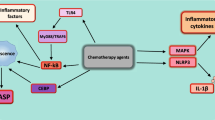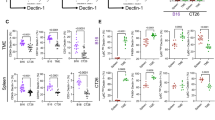Abstract
Background
Previously, albendazole (ABZ) has been reported as an anti-parasitic drug rather than anti-tumor drug. Our study aim to investigate whether ABZ also has a potential anti-tumor effect by shaping the tumor immune microenvironment and interrogate whether ABZ could synergize with the PD-L1 blockade.
Methods
C57BL/6 mice (C57) were intravenously injected with B16F10-luciferase (B16-luc) cells to establish a lung metastatic melanoma model and subcutaneously inoculated with B16-luc cells to establish a subcutaneous tumor model. The tumor volume and tumor metastasis loci of the mice were measured by a vernier caliper and in vivo imaging. RNA sequencing was performed to analyze the different genes and pathways of immune cells in the tumors. Flow cytometry and immunofluorescence were used to analyze the different subsets of tumor-infiltrating immune cells.
Results
The results suggested that ABZ significantly inhibited lung melanoma metastasis with decreased fluorescence intensity and nodule score and mediated the regression of subcutaneous melanoma in mice with decreased tumor volume. Moreover, RNA sequencing results showed that ABZ regulated the gene expression levels and pathways of immune cells in the tumor microenvironment (TME). Meanwhile, flow cytometry and immunofluorescence showed that the number and percentage of CD8+ T cells, CD4+ T cells, and TH1 cells were enhanced in tumors after ABZ treatment. Furthermore, the combination of ABZ and anti-PD-L1 treatment significantly potentiated anti-tumor efficacy in both lung metastasis and subcutaneous melanoma models and mediated an increase in the percentage of CD8+ T cells, CD4+ T cells, and TH1 cells as compared to the control group.
Conclusion
ABZ inhibits melanoma growth and metastasis. Moreover, ABZ synergized with PD-L1 blockade mediates tumor regression.








Similar content being viewed by others
Data availability
All data used in this study are included in the article. Please contact the corresponding author for data requests.
References
Alitalo A, Detmar M (2012) Interaction of tumor cells and lymphatic vessels in cancer progression. Oncogene 31:4499–4508. https://doi.org/10.1038/onc.2011.602
Curti BD, Faries MB (2021) Recent advances in the treatment of melanoma. N Engl J Med 384:2229–2240. https://doi.org/10.1056/NEJMra2034861
Duraiswamy J, Kaluza KM, Freeman GJ, Coukos G (2013) Dual blockade of PD-1 and CTLA-4 combined with tumor vaccine effectively restores T-cell rejection function in tumors. Cancer Res 73:3591–3603. https://doi.org/10.1158/0008-5472.CAN-12-4100
Effern M, Glodde N, Braun M, Liebing J, Boll HN, Yong M, Bawden E, Hinze D, van den Boorn-Konijnenberg D, Daoud M, Aymans P, Landsberg J, Smyth MJ, Flatz L, Tuting T, Bald T, Gebhardt T, Holzel M (2020) Adoptive T cell therapy targeting different gene products reveals diverse and context-dependent immune evasion in melanoma. Immunity. https://doi.org/10.1016/j.immuni.2020.07.007
Fisher DT, Chen Q, Skitzki JJ, Muhitch JB, Zhou L, Appenheimer MM, Vardam TD, Weis EL, Passanese J, Wang WC, Gollnick SO, Dewhirst MW, Rose-John S, Repasky EA, Baumann H, Evans SS (2011) IL-6 trans-signaling licenses mouse and human tumor microvascular gateways for trafficking of cytotoxic T cells. J Clin Invest 121:3846–3859. https://doi.org/10.1172/JCI44952
Garbe C, Amaral T, Peris K, Hauschild A, Arenberger P, Basset-Seguin N, Bastholt L, Bataille V, Del Marmol V, Dreno B, Fargnoli MC, Forsea AM, Grob JJ, Hoeller C, Kaufmann R, Kelleners-Smeets N, Lallas A, Lebbe C, Lytvynenko B, Malvehy J, Moreno-Ramirez D, Nathan P, Pellacani G, Saiag P, Stratigos AJ, Van Akkooi ACJ, Vieira R, Zalaudek I, Lorigan P, European Dermatology Forum tEAoD-O, the European Organization for R and Treatment of C (2022a) European consensus-based interdisciplinary guideline for melanoma. Part 2: Treatment - Update 2022a. Eur J Cancer 170:256–284. https://doi.org/10.1016/j.ejca.2022.04.018
Garbe C, Amaral T, Peris K, Hauschild A, Arenberger P, Basset-Seguin N, Bastholt L, Bataille V, Del Marmol V, Dreno B, Fargnoli MC, Forsea AM, Grob JJ, Holler C, Kaufmann R, Kelleners-Smeets N, Lallas A, Lebbe C, Lytvynenko B, Malvehy J, Moreno-Ramirez D, Nathan P, Pellacani G, Saiag P, Stratigos AJ, Van Akkooi ACJ, Vieira R, Zalaudek I, Lorigan P, European Dermatology Forum tEAoD-O, the European Organization for R and Treatment of C (2022b) European consensus-based interdisciplinary guideline for melanoma. Part 1: Diagnostics: Update 2022b. Eur J Cancer 170:236–255. https://doi.org/10.1016/j.ejca.2022.03.008
Gershenwald JE, Scolyer RA, Hess KR, Sondak VK, Long GV, Ross MI, Lazar AJ, Faries MB, Kirkwood JM, McArthur GA, Haydu LE, Eggermont AMM, Flaherty KT, Balch CM, Thompson JF, for members of the American Joint Committee on Cancer Melanoma Expert P, the International Melanoma D and Discovery P (2017) Melanoma staging: Evidence-based changes in the American Joint Committee on Cancer eighth edition cancer staging manual. CA Cancer J Clin 67: 472–492. https://doi.org/10.3322/caac.21409
Gide TN, Wilmott JS, Scolyer RA, Long GV (2018) Primary and acquired resistance to immune checkpoint inhibitors in metastatic melanoma. Clin Cancer Res 24:1260–1270. https://doi.org/10.1158/1078-0432.CCR-17-2267
Guy GP, Jr., Thomas CC, Thompson T, Watson M, Massetti GM, Richardson LC, Centers for Disease C and Prevention (2015) Vital signs: melanoma incidence and mortality trends and projections - United States, 1982–2030. MMWR Morb Mortal Wkly Rep 64: 591–596
He Z, Lei S, Liang F, Tan L, Zhang W, Xie L, Zheng H, Lu Y (2021) Low-dose albendazole inhibits epithelial-mesenchymal transition of melanoma cells by enhancing phosphorylated GSK-3beta/Tyr216 accumulation. J Oncol 2021:4475192. https://doi.org/10.1155/2021/4475192
Jhunjhunwala S, Hammer C, Delamarre L (2021) Antigen presentation in cancer: insights into tumour immunogenicity and immune evasion. Nat Rev Cancer 21:298–312. https://doi.org/10.1038/s41568-021-00339-z
Kaushik I, Ramachandran S, Zabel C, Gaikwad S, Srivastava SK (2022) The evolutionary legacy of immune checkpoint inhibitors. Semin Cancer Biol 86:491–498. https://doi.org/10.1016/j.semcancer.2022.03.020
Korbecki J, Grochans S, Gutowska I, Barczak K, Baranowska-Bosiacka I (2020) CC chemokines in a tumor: a review of pro-cancer and anti-cancer properties of receptors CCR5, CCR6, CCR7, CCR8, CCR9, and CCR10 ligands. Int J Mol Sci. https://doi.org/10.3390/ijms21207619
Leong SP, Gershenwald JE, Soong SJ, Schadendorf D, Tarhini AA, Agarwala S, Hauschild A, Soon CW, Daud A, Kashani-Sabet M (2011) Cutaneous melanoma: a model to study cancer metastasis. J Surg Oncol 103:538–549. https://doi.org/10.1002/jso.21816
Leon-Letelier RA, Bonifaz LC, Fuentes-Panana EM (2019) OMIC signatures to understand cancer immunosurveillance and immunoediting: Melanoma and immune cells interplay in immunotherapy. J Leukoc Biol 105:915–933. https://doi.org/10.1002/JLB.MR0618-241RR
Li YQ, Zheng Z, Liu QX, Lu X, Zhou D, Zhang J, Zheng H, Dai JG (2021) Repositioning of antiparasitic drugs for tumor treatment. Front Oncol 11:670804. https://doi.org/10.3389/fonc.2021.670804
Miller KD, Nogueira L, Devasia T, Mariotto AB, Yabroff KR, Jemal A, Kramer J, Siegel RL (2022) Cancer treatment and survivorship statistics, 2022. CA Cancer J Clin 72:409–436. https://doi.org/10.3322/caac.21731
Narasimhan PB, Akabas L, Tariq S, Huda N, Bennuru S, Sabzevari H, Hofmeister R, Nutman TB, Tolouei Semnani R (2018) Similarities and differences between helminth parasites and cancer cell lines in shaping human monocytes: Insights into parallel mechanisms of immune evasion. PLoS Negl Trop Dis 12:e0006404. https://doi.org/10.1371/journal.pntd.0006404
Neal JT, Li X, Zhu J, Giangarra V, Grzeskowiak CL, Ju J, Liu IH, Chiou SH, Salahudeen AA, Smith AR, Deutsch BC, Liao L, Zemek AJ, Zhao F, Karlsson K, Schultz LM, Metzner TJ, Nadauld LD, Tseng YY, Alkhairy S, Oh C, Keskula P, Mendoza-Villanueva D, De La Vega FM, Kunz PL, Liao JC, Leppert JT, Sunwoo JB, Sabatti C, Boehm JS, Hahn WC, Zheng GXY, Davis MM, Kuo CJ (2018) Organoid modeling of the tumor immune microenvironment. Cell. https://doi.org/10.1016/j.cell.2018.11.021
Owens B (2014) Melanoma. Nature 515:S109. https://doi.org/10.1038/515S109a
Ozga AJ, Chow MT, Luster AD (2021) Chemokines and the immune response to cancer. Immunity 54:859–874. https://doi.org/10.1016/j.immuni.2021.01.012
Reck M, Rodriguez-Abreu D, Robinson AG, Hui R, Csoszi T, Fulop A, Gottfried M, Peled N, Tafreshi A, Cuffe S, O’Brien M, Rao S, Hotta K, Leal TA, Riess JW, Jensen E, Zhao B, Pietanza MC, Brahmer JR (2021) Five-year outcomes with pembrolizumab versus chemotherapy for metastatic non-small-cell lung cancer with PD-L1 tumor proportion score >/= 50. J Clin Oncol 39:2339–2349. https://doi.org/10.1200/JCO.21.00174
Ruterbusch M, Pruner KB, Shehata L, Pepper M (2020) In vivo CD4(+) T cell differentiation and function: revisiting the Th1/Th2 paradigm. Annu Rev Immunol 38:705–725. https://doi.org/10.1146/annurev-immunol-103019-085803
Schadendorf D, van Akkooi ACJ, Berking C, Griewank KG, Gutzmer R, Hauschild A, Stang A, Roesch A, Ugurel S (2018) Melanoma. Lancet 392:971–984. https://doi.org/10.1016/S0140-6736(18)31559-9
Sleeman J, Schmid A, Thiele W (2009) Tumor lymphatics. Semin Cancer Biol 19:285–297. https://doi.org/10.1016/j.semcancer.2009.05.005
Snell LM, Osokine I, Yamada DH, De la Fuente JR, Elsaesser HJ, Brooks DG (2016) Overcoming CD4 Th1 cell fate restrictions to sustain antiviral CD8 T cells and control persistent virus infection. Cell Rep 16:3286–3296. https://doi.org/10.1016/j.celrep.2016.08.065
Spranger S, Koblish HK, Horton B, Scherle PA, Newton R, Gajewski TF (2014) Mechanism of tumor rejection with doublets of CTLA-4, PD-1/PD-L1, or IDO blockade involves restored IL-2 production and proliferation of CD8(+) T cells directly within the tumor microenvironment. J Immunother Cancer 2:3. https://doi.org/10.1186/2051-1426-2-3
Swain SL, McKinstry KK, Strutt TM (2012) Expanding roles for CD4(+) T cells in immunity to viruses. Nat Rev Immunol 12:136–148. https://doi.org/10.1038/nri3152
Swetter SM, Thompson JA, Albertini MR, Barker CA, Baumgartner J, Boland G, Chmielowski B, DiMaio D, Durham A, Fields RC, Fleming MD, Galan A, Gastman B, Grossmann K, Guild S, Holder A, Johnson D, Joseph RW, Karakousis G, Kendra K, Lange JR, Lanning R, Margolin K, Olszanski AJ, Ott PA, Ross MI, Salama AK, Sharma R, Skitzki J, Sosman J, Wuthrick E, McMillian NR, Engh AM (2021) NCCN Guidelines(R) insights: melanoma: cutaneous, Version 2.2021. J Natl Compr Canc Netw 19:364–376. https://doi.org/10.6004/jnccn.2021.0018
Takeuchi A, Saito T (2017) CD4 CTL, a cytotoxic subset of CD4(+) T Cells, their differentiation and function. Funct Front Immunol 8:194. https://doi.org/10.3389/fimmu.2017.00194
Wei SC, Levine JH, Cogdill AP, Zhao Y, Anang NAS, Andrews MC, Sharma P, Wang J, Wargo JA, Pe’er D, Allison JP (2017) Distinct cellular mechanisms underlie anti-CTLA-4 and anti-PD-1 checkpoint blockade. Cell. https://doi.org/10.1016/j.cell.2017.07.024
Weiss SA, Wolchok JD, Sznol M (2019) Immunotherapy of melanoma: facts and hopes. Clin Cancer Res 25:5191–5201. https://doi.org/10.1158/1078-0432.CCR-18-1550
Whiteman DC, Green AC, Olsen CM (2016) The growing burden of invasive melanoma: projections of incidence rates and numbers of new cases in six susceptible populations through 2031. J Invest Dermatol 136:1161–1171. https://doi.org/10.1016/j.jid.2016.01.035
Yi M, Zheng X, Niu M, Zhu S, Ge H, Wu K (2022) Combination strategies with PD-1/PD-L1 blockade: current advances and future directions. Mol Cancer 21:28. https://doi.org/10.1186/s12943-021-01489-2
Zamarron BF, Chen W (2011) Dual roles of immune cells and their factors in cancer development and progression. Int J Biol Sci 7:651–658. https://doi.org/10.7150/ijbs.7.651
Acknowledgements
This work was supported by research grants from the National Natural Science Foundation of China (Nos.81672694, 82272763). The authors would like to thank Prof. Wenyue Xu for providing laboratory support.
Funding
This work was supported by research grants from the National Natural Science Foundation of China (Nos.81672694, 82272763).
Author information
Authors and Affiliations
Contributions
W.N.Z., Z.Q.H., L.Y.Z.X. and Y.G.L. designed experimental research. W.N.Z., Z.Q.H., L.Y.Z.X., J. G. and L.C.T completed experimental research. W.N.Z., Z.Q.H. and L.Y.Z.X. wrote the first draft of the paper, prepared all figures and completed all data analysis. W.N.Z. and F.C.L. completed draft of revision and experiments of revision. J. Y., S. J. S., L.Y.Z.X. and Y.G.L. reviewed manuscript. L.Y.Z.X. and Y.G.L. are the creator and person in charge of the entire project. All authors have read and agreed to the final text.
Corresponding authors
Ethics declarations
Conflict of interest
All authors report no conflicts of interest.
Informed consent
Not applicable.
Institutional review board statement
The study protocol was approved by the Ethical Review of Experimental Animals of the Army Medical Center of the PLA (No. AMUWEC20237002).
Additional information
Publisher's Note
Springer Nature remains neutral with regard to jurisdictional claims in published maps and institutional affiliations.
Supplementary Information
Below is the link to the electronic supplementary material.
Rights and permissions
Springer Nature or its licensor (e.g. a society or other partner) holds exclusive rights to this article under a publishing agreement with the author(s) or other rightsholder(s); author self-archiving of the accepted manuscript version of this article is solely governed by the terms of such publishing agreement and applicable law.
About this article
Cite this article
Zhang, W., He, Z., Liang, F. et al. Albendazole induces an anti-tumor effect and potentiates PD-L1 blockade immunotherapy. J Cancer Res Clin Oncol 149, 16763–16778 (2023). https://doi.org/10.1007/s00432-023-05415-5
Received:
Accepted:
Published:
Issue Date:
DOI: https://doi.org/10.1007/s00432-023-05415-5




